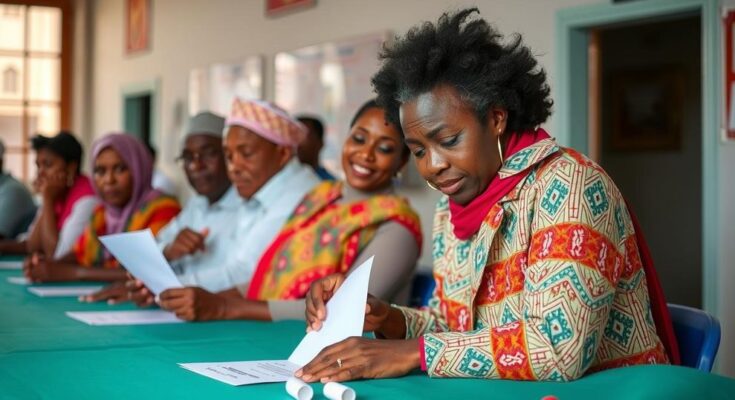Chad is holding contested legislative and local elections, dismissed by opposition parties as a sham. Amid violent instability and a history of electoral fraud, President Mahamat Deby aims for a democratic transition, while critics fear further entrenchment of autocratic rule. With a media strike complicating the landscape, the stakes are high for Chad’s political future.
Chad is conducting legislative and local elections on Sunday, as announced by President Mahamat Idriss Deby Itno’s administration, which regards this as a significant movement towards a democratic transition. However, opposition parties term the elections a mere “masquerade” due to the prevailing atmosphere of dissent. The voting is set against several challenges, including continued attacks by Boko Haram and the cessation of a military pact with France. Following the death of former President Idriss Deby Itno in 2021, Mahamat Deby assumed power, winning a five-year presidential term under allegations of electoral malpractice.
In discussions surrounding the elections, government representatives argue that they will facilitate a “generational renewal” within the National Assembly and local governments, a provision which has been long overdue as the last legislative votes occurred in 2011. The transitional parliament formed post-Idriss Deby comprises 93 members selected through presidential decree. Notably, the opposition, led by Succes Masra of the Transformers party—who previously garnered 18.5 percent of votes against Deby’s 61.3 percent—refuses to engage in the electoral process, deeming it autocratic.
Infrastructure Minister Aziz Mahamat Saleh contends that the elections will bolster the president’s majority to implement his political agenda effectively. However, critics assert that the elections merely aim to legitimize a dynasty-like governance model amidst a backdrop of internal and external turmoil. Furthermore, the elections are occurring under a near-total media blackout, as journalists are on strike protesting state-imposed restrictions. Chad, despite its oil resources, remains near the bottom of the UN Human Development Index, exacerbated by recent natural disasters affecting large populations in the region.
The current elections in Chad represent a critical juncture in the nation’s political landscape, particularly in light of President Mahamat Idriss Deby Itno’s rise to power following his father’s lengthy rule. Historical context regarding the opposition’s longstanding accusations of autocracy and electoral fraud shapes the present political discourse. The social ramifications of ongoing violence from extremist groups and adverse economic conditions also frame the discussions surrounding the elections, where many citizens express skepticism about government intentions and democratic legitimacy.
In summary, the legislative and local elections in Chad are embroiled in controversy, as opposition parties boycott the process, labeling it a deceptive endeavor rather than a genuine step towards democracy. The backdrop of violence, past electoral fraud allegations, and current media restrictions adds layers of complexity to this electoral exercise, raising questions about the legitimacy and future governance of Chad under President Mahamat Deby. This election cycle indicates significant challenges ahead for democratic dialogue and development within the country.
Original Source: www.barrons.com




